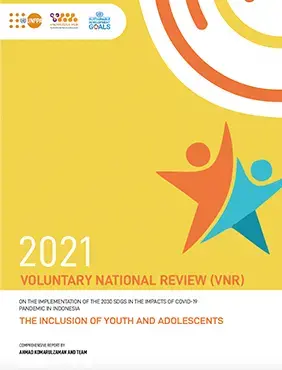This report was prepared to update data (in 2020) and trend analysis for Sustainable
Development Goals (SDG) indicators presented in the 2015-2019 SDGs related to Youth and
Adolescents initiated by UNFPA. The report focuses on the achievements of 9 of 17 SDGs in
the VNR 2021, reflecting the social development pillars (Goal 1, 2, and 3), the economic development
pillars (Goal 8, 10, and 17), the environmental development pillars (Goal 12 and 13) and legal and governance
development pillars (Goal 16), with considering the effects of the COVID-19 pandemic. In addition, the
report also presents data and trend analyses of the impact of COVID-19 on goals related to youths and
adolescents, such as Goal 4, 5, 6, 7, 9, and 11. The report is part of a monitoring effort and accelerating the
achievements of the 2030 SDGs. It was developed through some stages, including a literature review on
youth issues and secondary data analysis, as well as consultation and discussion with various
stakeholders on youth issues in Indonesia.
Data for 2020 was collected from various sources, such as data from Statistics Indonesia (Locally known
as BPS) and other agencies and calculated indicators based on National Socioeconomic Survey
1 (Susenas: KOR) 2020 performed by the Knowledge Hub of Universitas Indonesia (UI) . There are indicators
that cannot be updated, due to unavailable or inaccessible data, such as data for indicators related to
poverty, inequality and their disaggregation by welfare groups, which require information from the
Susenas consumption and expenditure module 2020. The data related to employment cannot also be
updated because it requires information from National Labor Force Survey (Sakernas) 2020. The
Knowledge Hub UI is not authorized to collect data from these sources. Because the 2020 data was not
available, trend analyses were carried out based on 2015-2019 data, and the impacts of the COVID-19
pandemic were analyzed based on literature studies (if available).
Meanwhile, some data related to specific objectives of SDGs are not possible to be elaborated by
youth age groups because they represent data at the company or environmental level, such as Goal 2,
12, and 13. Information was also collected through the youth and adolescent consultation for the VNR
preparation held on 20-21 April 2021 and attended by 250 youth and adolescents representing groups
from various regions in Indonesia. It was held together with BAPPENAS and UNICEF. In addition, a
literature review was also conducted on youth issues and previous achievements on youth indicators.
The structure of this report includes an analysis of trends for each SDGs related to youth and adolescents,
except Goal 14 and 15. Regarding the SGD indicators which remain as the focus of the youth and
adolescents VNR 2021, the analysis elaborates the challenges faced in achieving youth and adolescent
SDGs, as well as steps that need to be taken to accelerate the achievements of youth and adolescent SDGs
by 2030. An exception to the analysis applies to the discussion on Goal 10 and 12, which only presents a
brief trend analysis and literature review because the indicators for these two goals are not included in
the subject matter of 2015-2019 youth and adolescent SDGs.


